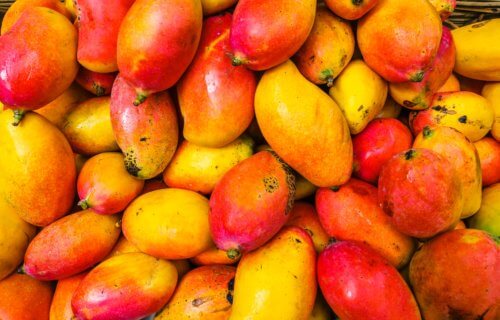BOSTON — People love the sweet tropical flavor of mangos. Grown in over 100 countries, they’re one of the most popular fruits in the world. Two new studies now give even more reasons to love them, showing that the fruit may lower risks of vascular issues while improving antioxidant levels in overweight and obese adults.
“Mangos contribute a variety of nutrients, phytochemicals and bioactive compounds to the diet—including 50 percent of the daily value (DV) for vitamin C, 15 percent of the DV for folate and 15 percent of the DV for copper, and mangoes are also a predominant source of the bioactive compound mangiferin,” says Mee Young Hong, Ph.D., the primary investigator for both studies and professor at the School of Exercise and Nutritional Sciences in the College of Health and Human Services at San Diego State University, in a media release. “It’s likely the unique matrix of vitamins and bioactive compounds synergistically working together that resulted in our findings.”

Both interventions studied the same 27 participants over the course of 28 weeks, of which 16 were men and 11 were women. They were split into two groups and told to either eat a 100-calorie snack of mangos (1 cup) or a 100-calorie snack of low-fat cookies for 12 weeks, as part of an otherwise relatively healthy lifestyle and eating patterns. After the first 12 weeks, the participants took a four-week break before switching groups and eating the snack they didn’t initially choose for another 12 weeks. During each testing period, the participants gave fasting blood samples at baseline, week four, and week 12.
In comparison to the low-fat cookies, mangos significantly improved two markers of oxidative stress, effectively reducing vascular cell adhesion molecule-1 (VCAM-1) and increasing superoxide dismutase (SOD). The second study showed an increase in glutathione peroxidase (GPX), a potent antioxidant enzyme. There were no significant results in vascular, inflammatory, and immune risk factors and mediators tested.
“SOD and VCAM-1 play opposite roles as risk factors for vascular issues,” explains Young Hong. “While the SOD enzyme reduces risk by breaking down charged oxygen molecules called superoxide radicals, which are toxic, the VCAM-1 gene causes cells to stick together along the vascular lining, leading to increased risk for issues. To achieve good vascular health, we want to see these two compounds move in opposite directions—SOD up and VCAM-1 down—which is what happened in the study. Additionally, GPX acts by converting hydrogen peroxide to water in the body, thus reducing the harmful oxidative effects of hydrogen peroxide.”
It makes sense that choosing whole fruits over cookies (even if they’re low-fat), would yield better biomarkers. Moreover, mangos boast an impressive nutrient profile, providing more than 20 different vitamins and minerals in just three-quarters of a cup.
“Vascular diseases include strokes, which are the third leading cause of death in the United States. Helping Americans find food-first solutions for reducing risks, like including more fruits, such as mangos, in the diet, is critical to reverse these trends and improve public health,” adds Young Hong.
The findings were presented at Nutrition 2023, the American Society for Nutrition’s Annual Conference. Both studies received funding from the National Mango Board.
You might also be interested in:
- Blue light is bad for your eyes — but great for your mangos!
- Belly’s best friend: Mangoes prevent constipation, improve gut health
- Best Fruit For Weight Loss: Top 5 Produce Picks, According To Experts


Mangos versus cookies! Come on. Next trial should be bananas versus cigarettes!